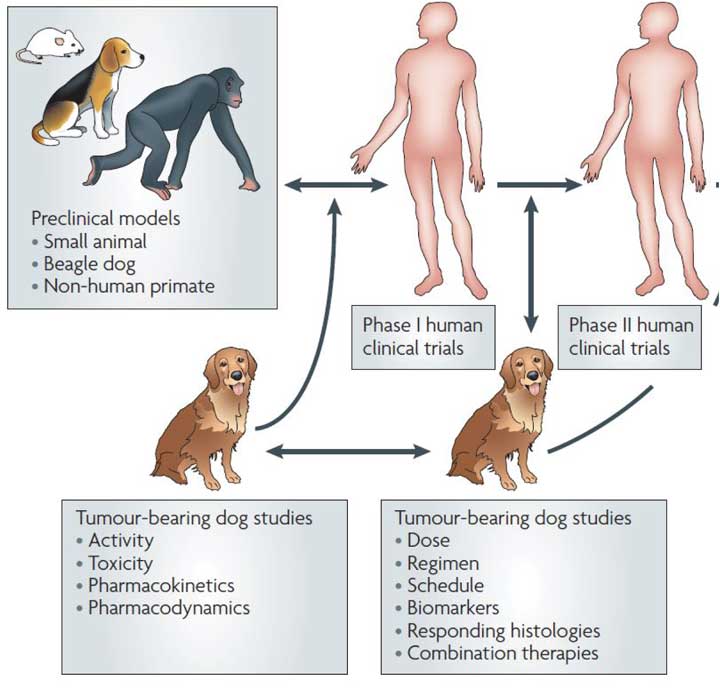If you’re new to pet cancer, the phrase “comparative oncology” might be new to you. It was to us when our Jerry was diagnosed with osteosarcoma. But it didn’t take long for us to hear this phrase over and over again from friends like the Puppy Up Foundation. Pretty soon we learned the definition of comparative oncology and why it’s so important for all of us to rally behind funding for this important cancer research.
How Comparative Oncology Clinical Trials Work

Why You Should Care About Comparative Oncology
According to the Puccini Foundation, comparative oncology:
. . . studies cancers that occur naturally in animals (not just dogs, but also cats, horses and other domesticated animals); it uses its findings to develop treatments and cures that can benefit people, as well as animals.
The Puccini Foundation goes on to explain . . .
Comparative oncology can help uncover new, improved treatments for human cancer even faster than human studies alone:
- Animals’ shorter life spans allow researchers to determine efficacies of treatments faster. This means the discovery of new cures could happen sooner than ever.
- Because many cancers in domestic animals closely resemble human cancer, scientists gain important insight that rodent-based cancer studies cannot provide.
- The incidence of many types of cancer is the same or greater in dogs and cats as in humans providing a significant potential population for research.
- Animals’ size and structural similarity allows for refinement of surgical and other techniques that may also be effective in humans.
- Similar diagnostic tools can be used on animals as on humans.
Why Clinical Studies Help Advance Comparative Oncology
As we mentioned in this recent Tripawds News Blog post, “Can Your Tripawd Cure Cancer?“, the most promising cancer research is happening in comparative oncology clinical trials for pets and people. That’s where the Flint Animal Cancer Center’s One Cure initiative steps in.
Known as “One Cure,” this initiative brings together human and veterinary oncology professionals to mutually study how treatment of pets with cancer can improve therapies for human patients – and lead to “one cure” for both pets and people alike.
In the following downloadable paper, “The Role of Clinical Studies for Pets with Naturally Occurring Tumors in Translational Cancer Research,” published by the National Academy of Sciences, we learn about the most current findings in comparative oncology by cancer research superstars in veterinary and human medicine.
This National Academy of Sciences paper is based on a meeting of comparative oncology experts that took place in June 2015. It’s written in simple language that even laypeople like us can understand.
We encourage you to read it so that you can educate yourself about comparative oncology and why it’s so important that our cancer research donations are directed at organizations leading the way, the One Cure initiative.
And if you really want to learn more about comparative oncology research for pets and people, these YouTube videos from the meeting that the paper is derived from are available for public viewing.
DOWNLOAD “The Role of Clinical Studies for Pets with
Naturally Occurring Tumors in Translational Cancer Research,”

1 thought on “Why You Should Care About Comparative Oncology Research”